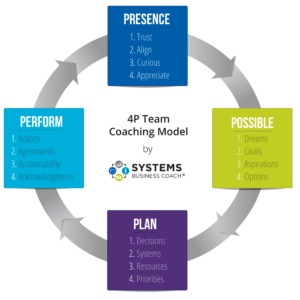As a coach, what’s your approach working with startups and entrepreneurs?
Interestingly, many coaches shy away from this niche, often because they struggle to answer this very question. In fact, a mere 3% of coaches affiliated with the International Coaching Federation (ICF) categorize themselves as small business coaches.
Most coaches prefer to work with CEOs and executives from larger corporations. Perhaps, they are finding comfort in the established structures and predictable challenges that come with these roles.
It’s common for coaches to specialize in leadership coaching and brand themselves as ‘executive coaches,’ targeting the upper echelons of the corporate world.
The challenge of this focus on corporate executives is that leaders from smaller firms, especially small business owners, often find themselves excluded from valuable coaching opportunities.

However, let’s flip the script and consider a different angle. What if the exact same skill set that makes you an effective executive coach could also make you an exceptional start-up and entrepreneur coach?
The core principles of leadership, strategic thinking, and accountability don’t change just because the business’s size or the title on the door does.
By expanding your practice to include entrepreneurs, you could be tapping into a vast, underserved market, applying your proven coaching methods in new and rewarding ways.
Overlooking the small business sector underestimates its pivotal role in local economic development, job creation, poverty reduction, and broader economic expansion.
According to a 2020 study by Gherghina, supported by reports from the International Labour Organization (ILO) in 2022, small businesses generate an astounding 70% of global employment.
So how do you coach entrepreneurs and start-ups?
Coaching Entrepreneurs and Start-ups: Unlocking Potential with the Effective Business Coaching Model
The landscape of start-ups and small businesses is ever-changing. It is fraught with challenges but also filled with opportunities for impactful growth.
As a business coach, you have the skillset to guide these emerging leaders through the rough terrains of entrepreneurship.
The Effective Business Coaching Model, developed by Systems Business Coach Founder, Beverlee Rasmussen, offers an excellent framework to drive transformative changes in start-ups.
Here’s how to use this model to bring out the best in your entrepreneurial clients.
The 4 P’s: The Cornerstones of Effective Business Coaching
In working with small business owners and entrepreneurs, employing a structured framework like the 4 P’s (Presence, Possible, Plan, and Perform) can offer a multifaceted approach to coaching.
This model not only sets the stage for a trusting relationship, but also provides a roadmap for developing actionable strategies and achieving high-performance outcomes.
As a matter of fact, it fosters a symbiotic relationship between the coach and the client. It does so, while mutually benefiting both parties and substantially increasing the likelihood of success for the start-up.
The 4 P’s guide entrepreneurs in communicating their vision, crafting effective strategies, and leading their teams to success.
Thus, they offer a comprehensive approach that serves both individual and team development.

1. Presence: Building a Foundation of Trust and Alignment
Trust: Using the ICF Core Competencies
When coaching entrepreneurs, building trust is just as vital as with corporate executives. Utilizing ICF Core Competencies, coaches can ensure confidentiality, non-judgment, and active listening to establish a strong foundation.
This is especially crucial for entrepreneurs, who are often navigating the uncertain terrains of start-up life and value a secure, collaborative relationship with their coach.
Adhering to professional standards and ethics assures your clients of your integrity and competence.
Alignment and Core Values
Ensure that the entrepreneurs operations align with its core values — usually the aspects that motivated the business in the first place.
Probe questions like, “Which of your core values are currently most evident in daily operations?”
Curiosity: The Key to Innovation
In a coaching relationship with entrepreneurs, fostering a culture of curiosity can be a game-changer.
By encouraging psychological safety through trust and confidentiality, you empower your clients to think innovatively, just as you would with corporate executives.
In fact, this openness to curiosity helps tackle challenges more constructively, paving the way for meaningful progress and success in the entrepreneurial journey.
Appreciation: More than Just a ‘Thank You’
Incorporate the principles of Appreciative Inquiry to strengthen the coach-client relationship between you and the small business owner.
Indeed, this positive approach not only fortifies the foundation of trust and collaboration, but also has the potential to increase productivity and engagement substantially.
In fact, Appreciative Inquiry helps entrepreneurs focus on their strengths and possibilities, crucial for fostering innovation and achieving long-term success.
2. Possible: Dreams, Goals, Desires, Options
In the “Possible” stage of the effective business coaching model, your role as a coach is to help small business owners explore their dreams, goals, desires, and options.
Help entrepreneurs to articulate and share their dreams and desires. Often, just the act of sharing these aspirations can galvanize an entire team towards greater productivity.
What is your small business owner client not saying? What limiting beliefs are you noticing about what is possible? What is the purpose of the stated goals? What options do they have?
3. Plan: Decisions, Systems, Resources, Priorities
Decision-Making
Ask questions about your small business owner clients decision-making processes. Do so especially if they are feeling overwhelmed by the sheer volume of decisions they need to make every day.
Systems
Focus on aligning the start-up’s processes and systems with their vision and values.
This will facilitate sustainable changes and foster a relationship that is conducive to coaching.
Resources
Through open questioning, determine what internal and external resources are needed to meet goals and implement changes.
Priorities
Encourage start-up leaders to evaluate their organizational priorities. This can often result in newfound clarity that helps keep their focus sharp.
4. Perform: Actions, Agreements, Accountability, Acknowledgement
Here, we get into the nitty-gritty of actualizing plans. Without giving advice, co-create specific action steps and establish mutual agreements to how the coachee plans to move forward.
Ask “What will it mean to you to have taken this action?” “What are you agreeing to now that we have explored this topic?” and “Who will you ask to help you?”
Accountability and Acknowledgment: The Lasting Touch
The Perform step of the 4P model aligns with the International Coach Federation (ICF) core competency of “Managing Progress and Accountability.”
This competency focuses on helping the client set and manage achievable goals, and keeping them accountable for their commitments.
Besides, it encourages recognizing and celebrating achievements and progress, no matter how small. This is where the “acknowledgment” part comes in.
Overall, the idea is to hold the client responsible for their actions while also appreciating the efforts and milestones along the journey.

Coaching is not just about solving problems. It’s about building a pathway for sustained growth and success.
As you consider offering your services to start-ups and entrepreneurs, remember the following. Your coaching could be the catalyst they need to transform their ambitions into tangible achievements.
With the Effective Business Coaching Model, you’re well-equipped to guide them on this exciting journey.
Ready to elevate your coaching practice and specialize in helping start-ups and small businesses thrive?
Equip yourself with the necessary tools, techniques, and best practices. Do so in order to make the coaching journey effective for your clients and seamless for you.
Consider beginning with our Small Business Coaching Foundations course, designed to give you the strategic edge you need in this unique coaching niche.
Discover more and enroll today at Small Business Coach Training Foundations Group.







